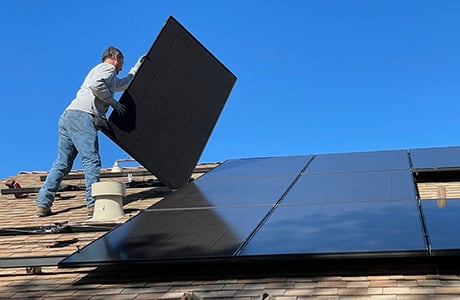The Ultimate Guide to Commercial Solar Power: What Companies Need to Know in Fort Lauderdale
The Ultimate Guide to Commercial Solar Power: What Companies Need to Know in Fort Lauderdale
Blog Article
Whatever You Need to Understand About Solar Power Installment and Its Benefits
Solar power installation stands for a substantial innovation in power solutions, integrating technology with sustainability. Recognizing the nuances of this installment, consisting of connected prices and maintenance, is vital for homeowners considering this financial investment.
Understanding Solar Power Fundamentals
Solar power, taken advantage of with solar cells, represents a crucial improvement in sustainable power modern technology. This process not only minimizes greenhouse gas discharges but additionally reduces reliance on non-renewable energy sources.
In enhancement to solar batteries, solar power systems can consist of solar thermal technologies, which capture sunshine to generate heat for household and commercial applications. The flexibility of solar energy enables various configurations, from little domestic setups to large solar farms.
The efficiency of solar panels is influenced by aspects such as the angle of setup, geographic place, and weather condition conditions. While solar innovation has actually advanced substantially, ongoing research study proceeds to enhance effectiveness and reduce costs.
Recognizing these essentials prepares individuals and organizations to assess solar energy's practicality for their power needs. As the globe progressively focuses on lasting energy solutions, solar power stands apart as a leading choice, adding to a cleaner and even more sustainable future.

The Solar Installment Refine
The trip from recognizing solar power to its useful application includes a systematic installment process that makes sure optimum performance and efficiency. Originally, a comprehensive website analysis is performed to assess variables such as roofing positioning, shielding, and architectural stability. This assessment aids to identify the system dimension and type that finest suits the specific energy needs of the home.
Next, an in-depth style phase adheres to, where solar engineers develop a customized layout, incorporating the proper solar panels, inverters, and installing systems. When the layout is wrapped up, the installment stage begins, normally entailing the mounting of solar panels on the roof or ground, link of electrical parts, and combination with the home's existing electrical system.
Academic resources are provided to house owners, empowering them to take full advantage of the advantages of their new solar system. This structured procedure not just promotes a smooth installment yet likewise boosts the long-term effectiveness of solar power systems.
Prices Included in Installment
When considering the setup of a solar energy system, recognizing the linked costs is crucial for house owners and organizations alike. The total expenditure of solar installation can vary substantially based upon numerous aspects, including system size, type of solar panels, and installment intricacy.
Normally, the primary expenses include the photovoltaic panels, inverter, mounting hardware, and labor. Usually, household solar setups can range from $15,000 to $30,000 before any federal or state rewards. Additionally, installment prices might include permitting fees, evaluation fees, and the expense of connecting the system to the grid.
It is likewise important to take into consideration recurring upkeep and possible repair service expenses, although planetary systems usually need marginal upkeep. Financing choices, such as solar fundings or leases, can aid handle upfront costs and improve access.
Lastly, local market conditions and neighborhood policies might impact rates, making it vital to obtain numerous quotes from trustworthy installers to guarantee competitive pricing. best solar energy company in fort lauderdale. By thoroughly reviewing the expenses entailed, people can make educated choices that align with their financial capacities and energy demands
Along with cleaning, it's critical to check the system's performance with information evaluation. Numerous modern-day solar systems come furnished with tracking software application that can alert property owners to any decline in effectiveness or functional concerns.
For comprehensive support, take into consideration partnering with reputable solar installation firms that supply upkeep contracts. These agreements commonly consist of regular inspections, repair work, and client assistance, making certain that any concerns are attended to immediately. By buying maintenance and support alternatives, house owners can delight in the full benefits of solar power while minimizing potential disturbances to their energy supply.
Final Thought
In verdict, solar power installment presents a feasible solution for reducing energy costs, improving residential property values, and advertising ecological sustainability. Welcoming solar innovation eventually sustains a change in the direction of cleaner energy sources, cultivating a more lasting future for homeowners and the broader area.
Report this page